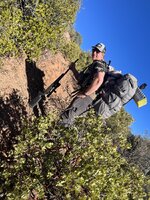I’m naturally a thin guy. In the last 6 months or so I’ve started doing some simple strength training. Have definitely gained strength, muscle mass, and weight.
I’m wondering if others who have done that have noticed any changes, positive or negative, for backcountry hunting. Strength in the legs, back, and shoulders seems like an obvious benefit, especially during the pack out. but I wonder if muscle elsewhere is superfluous mass in the mountains. This all assumes that one maintains their cardio fitness, of course.
I didn’t notice much this season, but I also didn’t push myself that hard this year.
Share your experience.
I’m wondering if others who have done that have noticed any changes, positive or negative, for backcountry hunting. Strength in the legs, back, and shoulders seems like an obvious benefit, especially during the pack out. but I wonder if muscle elsewhere is superfluous mass in the mountains. This all assumes that one maintains their cardio fitness, of course.
I didn’t notice much this season, but I also didn’t push myself that hard this year.
Share your experience.

